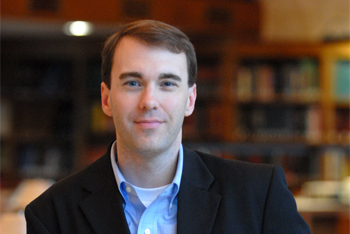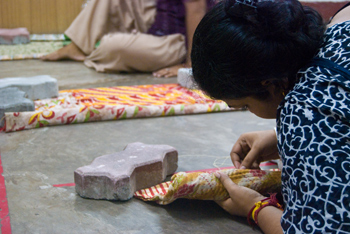Editor’s note: As the Christian landscape changes, leaders must ask and answer a new question: What’s the future of denominations? This interview is part of an occasional series that offers insight on this vital issue. To see the entire series, click here.
Editor’s note: In June 2020, nearly three dozen people alleged that they saw or experienced “spiritual and psychological abuse" by Christopher L. Huertz; he posted a public apology on his webpage in which he acknowledged that some of his friendships with women “became inappropriate in nature.” A later investigation by an independent, third-party investigator on behalf of Gravity found no evidence of misconduct. Gravity is no longer in operation.
The mission organization Word Made Flesh brings together Christians from different denominations as part of its focus on “grass-roots communities of hope,” said Chris Heuertz, former international executive director of the organization. In that way, the group strives to affirm what Christians have in common, he said.
Heuertz began working with Word Made Flesh in India after graduating from Asbury College in Kentucky in 1994. He began serving as its international executive director in1996. He is the author of several books, including “Simple Spirituality: Learning to See God in a Broken World” and “Friendship at the Margins,” co-authored with Christine D. Pohl.
He spoke with Faith & Leadership about the good and the bad influences of denominations, and why his organization rejected an ecclesiastic structure. The video is an excerpt from the following edited transcript.
Q: How does your organization, Word Made Flesh, see itself in relationship to Christian denominations?
We had years of conversations around whether Word Made Flesh was a church or was within the church or was a serving component of the church. We pulled together about 20 of our international leaders to talk about our mission, and landed on organizing ourselves around grass-roots communities of hope, rather than structuring ourselves ecclesiastically.
Affirmation of inclusion in the body of Christ is the purest expression of denominations. Sadly, the history of denominations is marked by exclusion. [At Word Made Flesh], we work toward affirmation by bringing Christians from different denominations together. It’s an experiment in reaching toward the center, where we place Christ in everything, and finding continuity.
Q: As an outside observer, do you see any reasons for denominations to be encouraged?
The gift of denominations is unifying diversity around principle, around theology and doctrine. Community is best expressed that way. When you see community happen, it’s a tangible sign that the kingdom of God has arrived.
The danger is that denominations will build up dividing walls. Though doctrine is central to our core beliefs as Christians, doctrine can be divisive. We try to affirm what we hold in common: that this is a world full of suffering, and there’s the possibility of a good God in a world that has legitimate reasons to question God’s goodness.
Q: Give us an example of where you’ve seen ecumenism work among doctrinally different Christian groups.
We have a community in Romania; the Orthodox Church, the Baptists, the Catholic and the Pentecostal Church are all in the neighborhood where we’re working. There’s not a whole lot of unity; in fact, there’s a lot of division within those worshipping in the city.
But when we put the vulnerabilities of children at the center, all those Christians can agree on what’s wrong and work together for what’s right. We don’t have to theologize it, other than affirming the imprint of God in humanity and the necessary theological implications that has on loving God while in the neighborhoods.
Q: Mainline denominations have been committed to the idea of ecumenism for 100 years. If you’re a denominational executive, how do you steer a big organization in that direction?
Look at Mother Teresa. She had challenges not unlike those that denominational execs face. She organized the Missionaries of Charity with a commitment to Christ first, looking for Christ on the road, discovering Christ among the needy.
[Mother Teresa’s community] had a flat structure of shared poverty, of shared vows, of shared commitments. There’s accountability in that, and simplicity. Sometimes we overcomplicate things for the sake of efficacy. If we want to do it well, we’ll never be efficient. If we want to do it in community, it’ll always get harder. But [doing things in community] also levels some of the speed bumps that become institutional hang-ups. Mother Teresa kept it simple. She kept it Christ-centered. She kept it with and for the people.
Q: Word Made Flesh has some marks of an institution. It’s been around for several decades and can be found from country to country. How have you managed to remain an un-institutional institution?
We want to put our friends at the center of everything we do. And we believe they deserve the best. Organizing the movement toward bearing witness to hope means not cutting corners and not being sloppy. When we don’t listen to one another, when we start making decisions based on the health of the institution rather than hope for people, we’ve headed down a dangerous path.
We want to rewind and habitually revisit our values. And those values have to be embodied by real people. If they’re not, then it’s an illusion. It’s an abstraction. Idealism may compel some of us to be faithful in service, but that will wear thin.
Q: How does your leadership differ now that you’re a seasoned veteran with gray in your hair, as opposed to when you were a 20-something bomb thrower?
Oh, boy. The humiliations of the soul have been a grace -- coming to terms with my own limitations and having the freedom to make mistakes. Journeying through the consequences of those mistakes toward the possibility of restoration has been significant. Learning to give myself a little grace has helped create a culture in our community affirming our humanity as something God created in us. And when we can be our best selves, it means we have to also receive the worst in ourselves. At Word Made Flesh, we want to expect the best from one another and offer grace for the worst in each other.
Q: What has been gained and lost as Word Made Flesh has grown in size?
As we’ve matured and found our voice, we’ve become more confident. We’ve grown up a little bit and become more realistic about our own limitations.
Awareness of our limitations helps us avoid [the] frenetic paces and burnout typical of activist communities. What follows that is cultivating the contemplative basis for active service. As we’ve matured, this has been one of the greatest rediscoveries.
We’ve lost the intimacy of being a guerrilla band of six to 10 folks who share a vocation -- when a staff retreat could happen at a table over a meal. But faithfulness to vocation is attractive. It has invited others to join us, and we need the help. So we lose the intimacy of gathering around one table, but we gain the gift of sharing vocation with more folks.
Q: How does Word Made Flesh stay true to its initial vision over time?
Revisiting what brought us together holds us together, remembering the fundamentals. Our journal is put together four times a year. It is essentially 24 pages reflecting on one of our core values. We read and practice that reflection as a community. We continually revisit our lifestyle celebrations [WMF’s term for its nine core values].
We also revisit our commitment to service as an expression of loving Christ while in the world. The best of what we do doesn’t come from our strategic starting points but from our theological principles.
We also put people in the center of everything, so that things are driven by relationship. We hope to replicate the desire to be in right relationship with God in organizing folks around a movement, around a vision, around a community.
Q: Please talk about ways your community learned from Mother Teresa how to treat money.
From the early days of organizing Word Made Flesh, we looked at the rupees, the pennies, the nickels, the dimes and held them carefully; we could cause great harm with money. We hold it loosely, with open hands. None of it is ours anyway. We try to submit our opportunities and access as resources to our friends who lack them. We try to let their presence in our lives become the prophetic presence of Christ.
We want lifestyles that respect our friends who are poor; that helps us be accountable. Within Word Made Flesh, using money the way we would hold vulnerable children speaks to our integrity. There is the possibility to be careful and loving as well as the potential to be dangerous and harmful. We can be compassionate people on the streets, but if we’re sloppy with how we handle finances, there’s a breakdown.
Q: Some of your friends in India, such as Samuel Kamaleson, were evangelical leaders of a previous generation. How do you take their gifts and run in your own direction with them?
Dr. Kamaleson thinks young and believes in young people. He made time for us and listened and asked us questions. He included us. He brought us along with him and introduced us and exposed us to opportunities that we hadn’t earned.
In Word Made Flesh we’ve brought that forward with an organizational commitment to staying young. That means giving significant positions of leadership, with the possibility of institutional impact, to younger folks, who haven’t proven themselves or maybe aren’t qualified. We want to build a support structure that allows them to succeed; when they succeed we all become more of who we need to be. Learning to follow those who are younger than us is an affirmation of our need to have our thought processes and assumptions critiqued. If we don’t, we’re going to homogenize, congeal and get lumpy and crusty and look like every other institution that became inflexible.
Q: In this new, “flat” world, is it important that North Americans are not running everything?
The flattening of the global world is a good image to reflect on, but even as the world may be flattening, it’s still slanted. It’s slanted in favor of those who are powerful, who have access to opportunity, to resources. In a flattening global reality, it’s dangerous to think opportunity is available in places where it actually isn’t.
As Word Made Flesh tries to build a round table, bringing all our partners together, we don’t say there are voiceless people. There are people we don’t listen to. We can’t give voice to the voiceless. We can listen better.
We try to balance this slanted table by disseminating the potential shape of [our organization] out into community. Every three years we pull together our leaders, our board chairs, our executive directors, our regional coordinators and field directors; that’s a group representing 12, 15, 16 different nationalities. We don’t require that you show up being able to speak or even understand English. We accommodate. We submit. We work together with folks where they are. And we learn to listen. It’s inefficient. But it’s community. I think that’s how it has to be.
Q: What are some of the spiritual practices you engage in as a community?
We describe ourselves as contemplative activists. The activist part comes pretty easily for a lot of us. Being on the streets, in the neighborhood, in the red-light districts or refugee camps -- it’s where a lot of us feel at home. For those of us who trend towards activism, sitting in silence is uncomfortable. In the past several years my wife Phileena has helped cultivate the contemplative basis for our active life with things like centering prayer. We do a lot of reflecting together.
Shared meals are central to our communal identity and our spirituality. There’s something very sacramental about the table. We have this hope that in eternity we’ll sit around this great banquet and feast and worship and celebrate together. We want to look like that today. We want to practice that now. And that becomes healing for us. That becomes unifying and prayerful for us.











